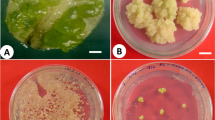Abstract
An improved protocol is described for the large-scale micropropagation of an elite date palm (Phoenix dactylifera L.) cultivar, Deglet Nour. Clonal plants were regenerated from somatic embryos derived from highly proliferating suspension cultures. Friable embryogenic calli were initiated from both leaf and inflorescence explants. Suspension cultures consisting of pro-embryonic masses were established from calli showing a high competency for somatic embryogenesis. The subculture of suspensions in liquid medium enriched with low amounts of plant growth regulators (1 mg l-1 2,4-dichlorophenoxyacetic acid with 300 mg l-1 charcoal) resulted in the differentiation of large numbers of somatic embryos. The productivity of the cultures increased 20-fold (from 10 to 200 embryos per month per 100 mg fresh weight of embryogenic callus) when embryogenic suspensions were used instead of standard cultures on solid media. The overall production of somatic embryos reached 10,000 units per litre per month. Partial desiccation of the mature somatic embryos, corresponding to a decrease in water content from 90% to 75%, significantly improved germination rates (from 25% to 80%). The cutting back of the cotyledonary leaf was also found to stimulate embryo germination. Flow cytometric analysis showed that the micropropagation protocol followed here did not affect the ploidy level of somatic embryo-derived plantlets.











Similar content being viewed by others
Abbreviations
- BAP :
-
6-Benzylaminopurine
- DAPI :
-
4′, 6-Diamidino−2-phenylindole
- 2,4-D :
-
2,4-Dichlorophenoxyacetic acid
- NAA :
-
α-Naphthaleneacetic acid
- PEMs :
-
Pro-embryonic masses
- PGR :
-
Plant growth regulator
References
Aberlenc-Bertossi F, Noirot M, Duval Y (1999) BA enhances the germination of oil palm somatic embryos derived from embryogenic suspension cultures. Plant Cell Tissue Organ Cult 56:53–57
Barre P, Noirot M, Louarn J, Duperray C, Hamon S (1996) Flow cytometric estimation of nuclear DNA content in coffee trees. Cytometry 24:32–38
Bhaskaran S, Smith R (1992) Somatic embryogenesis from shoot tip and immature inflorescence of Phoenix dactylifera L. cv. Barhee. Plant Cell Rep 12:22–25
Côme D (1970) Les obstacles à la germination. Masson, Paris
Daguin F, Letouze R (1988) Régénération du palmier dattier (Phoenix dactylifera L.) par embryogenèse somatique: amélioration de l'efficacité par passage en milieu liquide agité. Fruits 43:191–194
Daikh H, Demarly Y (1987) Résultats préliminaires sur l'obtention d'embryons somatiques et la réalisation de semences artificielles de palmier dattier (Phoenix dactylifera L.). Fruits 42:593–596
De Touchet B, Duval Y, Pannetier C (1991) Plant regeneration from embryogenic suspension cultures of oil palm (Elaeis guineensis Jacq.). Plant Cell Rep 10:592–532
Drira N (1983) Multiplication végétative du palmier dattier (Phoenix dactylifera L.) par la culture in vitro de bourgeons axillaires et de feuilles qui en dérivent. C R Acad Sci Paris 296:1077–1082
Drira N, Benbadis A (1985) Multiplication végétative du palmier dattier (Phoenix dactylifera L.) par réversion, en culture in vitro, d'ébauches florales de pieds femelles adultes. J Plant Physiol 119:227–235
Kreuger M, Postma E, Brouwer Y, Holst GJ (1995) Somatic embryogenesis of Cyclamen persicum in liquid medium. Physiol Plant 94:605–612
Masmoudi R, Rival A, Nato A, Lavergne D, Drira N, Ducreux G (1999) Carbon metabolism in in vitro cultures of date palm: the role of carboxylases (PEPC and RuBisCo). Plant Cell Tissue Organ Cult 57:139–143
Monnier M (1988) Embryogenèse zygotique et somatique. In: Zryd JP (ed) Cultures de cellules, tissus et organes végétaux. Presses Polytechniques Romandes, Lausanne, pp 120–134
Murashige T, Skoog F (1962) A revised medium for rapid growth and bioassays with tobacco tissue culture. Physiol Plant 15:473–479
Poulain C, Rhiss A, Beauchesne G (1979) Multiplication végétative en culture in vitro du palmier dattier (Phoenix dactylifera L.). C R Acad Agric France 11:1151–1154
Rival A, Beulé T, Lavergne D, Nato A, Havaux M, Puard M (1997a) Development of photosynthetic characteristics in oil palm during in vitro micropropagation. J Plant Physiol 150:520–527
Rival A., Beulé T, Barre P, Duval Y, Hamon S, Noirot M (1997b) Comparative flow cytometric estimation of nuclear DNA content in embryogenic calli and seed-derived oil palm (Elaeis guineensis Jacq). Plant Cell Rep 16:884–887
Rival A, Beulé T, Lavergne D, Nato A (1998) Growth and carboxylase activities in in vitro micropropagated oil palm plantlets during acclimatization : comparison with conventionally germinated seedlings. Adv Hortic Sci 3:111–117
Sass JE (1958) Botanical microtechnique. The Lowa State University Press, Ames
Sharma DR, Deepak S, Chowdhury JB (1986) Regeneration of plantlets from somatic tissues of date palm (Phoenix dactylifera L.) Indian J Exp Biol 24:763–766
Teixeira JB, Sondahl MR, Nakamura T, Kirby EG (1994) Establishment of oil palm cell suspensions and plant regeneration. Plant Cell Tissue Organ Cult 40:105–111
Tisserat B (1979) Propagation of date palm (Phoenix dactylifera L.) in vitro. J Exp Bot 30:1275–1283
Tisserat B, Demason D (1980) A histological study of development of adventive embryos organ cultures of Phoenix dactylifera L. Ann Bot 46:465–472
Triques K, Rival A, Beulé T, Puard M, Roy J, Nato A, Lavergne D, Havaux M, Verdeil JL, Sangare A, Hamon S (1997) Photosynthetic ability of in vitro grown coconut (Cocos nucifera L.) plantlets derived from zygotic embryos. Plant Sci 127:39–51
Acknowledgements
We are grateful to Dr. B.S. Ahloowalia, Plant Breeding and Genetics Section, Joint FAO/IAEA Division, International Atomic Energy Agency, Vienna, Austria, for his help with the manuscript, comments and encouragement. This investigation was supported by the International Atomic Energy Agency, under TC Project RAF/5/035.
Author information
Authors and Affiliations
Corresponding author
Additional information
Communicated by P. Debergh
Rights and permissions
About this article
Cite this article
Fki, L., Masmoudi, R., Drira, N. et al. An optimised protocol for plant regeneration from embryogenic suspension cultures of date palm, Phoenix dactylifera L., cv. Deglet Nour. Plant Cell Rep 21, 517–524 (2003). https://doi.org/10.1007/s00299-002-0558-5
Received:
Revised:
Accepted:
Published:
Issue Date:
DOI: https://doi.org/10.1007/s00299-002-0558-5



